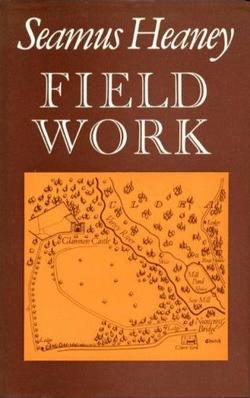Background
Field Work was Heaney’s first collection of poetry since his most celebrated collection, North in 1975. Field Work can largely be read as record of Heaney’s four years (1972-1976) living in rural County Wicklow in the Republic of Ireland after leaving the violence of The Troubles. Heaney had previously been living in Belfast as a professor at Queen's University. Denis O’Donoghue has referred to this period as "years of retreat only in the religious or monastic sense, a quiet time for thinking and renewal. Certain themes were sequestered, so that Heaney might start out again from first principles and deep affiliations." [1] Joshua Weiner writes: "While the move south seemed to some a deliberate withdrawal from a previous political commitment to fight the British presence in Ireland, Field Work indicates rather a growing commitment to stay engaged, but to do so by maintaining the long view, which asks questions more than it assumes positions." [2]
In a 1981 interview with Frank Kinahan, Heaney said Field Work "was an attempt to try to do something deliberately: to change the note and to lengthen the line, and to bring elements of my social self, elements of my usual nature, which is more convivial than most of the poems before that might suggest, to try to bring all that into play. [3]
Title
Dr. Rand Brandes tells the story of the title Field Work in The Cambridge Companion to Seamus Heaney. [4] Heaney originally wanted to name the work “Polder.” His editor, Charles Monteith, insisted that Heaney change the title because readers may not be able to pronounce the word. Heaney then wanted the title “Easter Water,” but this name was also discarded in favor of the final name: Field Work. Heaney said of the final title: "I gave Field Work that title partly because there’s an element of samplings in it. But I think there’s an opener note in it as well. What holds Field Work together—this is only my view of it—is a certain ease of the voice." [5] Heaney also provided his own explanation of how all his titles came about: “What usually happens is that I start to look for one [a title] once a ‘critical mass’ of poems gets written. I find that if I have a working title at that stage – say when half a volume is in existence – the title itself can help in shaping, or at least inclining and suggesting, the poems to come.” [6]
Reception
In a review for The New York Times , O’Donoghue called Field Work: “a superb book, the most eloquent and far-reaching book he has written, a perennial poetry offered at a time when many of us have despaired of seeing such a thing." [1]
Field Work is notably less political than North. O’Donoghue writes: “Readers who want Heaney to go on writing political poems, as in North, may be disappointed with Field Work."
In an interview with Henri Cole in the Fall 1997 volume of The Paris Review , Heaney describes this collection: "But even if Field Work was less obsessive, more formally rangy, full of public elegies and personal love poems and those Glanmore sonnets, it was still a proof that I could write poetry in my new situation." He also calls Field Work “one of my favorites. In its own way it was a book of change also; it moved me from the intensity of North to something more measured, in both formal and emotional terms." [7]
In the same interview, Heaney also said: “I tried very deliberately in Field Work to turn from a broody, phonetically self-relishing kind of writing to something closer to my own speaking voice. And I think that from Field Work onwards I have been following that direction. It's a very different kind of linguistic ambition now from what I was after in Death of a Naturalist or Wintering Out or North.
Not all reviews, however, were favorable. In the New York Review of Books , Al Alvarez calls Heaney an “intensely literary writer” and writes that the “reticence and self-containment” seen in North are not present in Field Work." Despite complimenting Heaney’s “real strength and originality” in “modest, perfect little poems," the review was notably unfavorable.
Alvarez commented: “In the circumstances, his current reputation amounts, I think, to a double betrayal: it lumbers him with expectations which he may not fulfill and which might even sink him, if he were less resilient; at the same time, it reinforces the British audience in their comfortable prejudice that poetry, give or take a few quirks of style, has not changed essentially in the last hundred years." [8]
Alvarez went on to say: “If Heaney really is the best we can do, then the whole troubled, exploratory thrust of modern poetry has been a diversion from the right true way.”
Upon Heaney’s death in August 2013, Sean O’Hagan wrote for The Guardian : “Field Work spoke of a world I knew and had just left behind, physically if not emotionally or psychologically…This was poetry I could connect with on several levels, about strange things I had seen with my own eyes and was now seeing through his.” [9]
Blake Morrison likewise wrote in The Guardian after Heaney's death that in Field Work, Heaney "presents himself as a wood-kerne escaped from the massacre, a man who has left the urban battlefront for Wordsworthian seclusion or Ovidian exile." [10]
